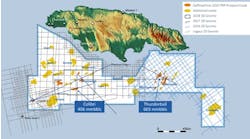Offshore staff
DHAHRAN, Saudi Arabia–Saudi Aramco has released a statement noting that it “unequivocally supports” the Saudi Vision 2030 economic plan.
Saudi Vision 2030, presented and approved April 25 by the Kingdom’s government, is an initiative designed to sustain economic growth, diversification, and job creation withinSaudi Arabia despite the weak market brought about by the “lower for longer” oil price scenario.
According to the plan, a small stake ofSaudi Aramco would be sold through an initial public offering. In addition, the Kingdom will up its public investment fund to $2 trillion from $160 billion. It also plans to localize some of its spending.
Amin H. Nasser, president and CEO of Saudi Aramco, said: “The Kingdom’s transformation vision demands innovation, technology, and R&D to spur a new era of industrial growth.
“Saudi Aramco’s continued leadership and investments in upstream and new investments in downstream expansion will help drive the widespread and rapid in-Kingdom development of a vibrant population of small and medium-sized enterprises focused on producing high-value finished and semi-finished products in the petrochemicals conversion sector.”
According to the Saudi Press Agency, Deputy Crown Prince Mohammed bin Salman told the Al Arabiya News Channel that “the Kingdom of Saudi Arabia was founded by late King Abdul Aziz and his companions without the need for oil,” later classifying the kingdom as having an “oil addiction … which disrupted the development.”
Khalid A. Al-Falih, chairman of Saudi Aramco, called Saudi Vision 2030 “a pioneering and game-changing plan.”
“Saudi Aramco will continue its commitment and remain fully engaged as a champion of transformation, ensuring that our significant contributions to the overall social and economic development of Saudi Arabia generate even greater positive impact in the future,” Al-Falih said.
In its statement, Saudi Aramco characterized the need to shift the Kingdom from an oil-based economy as “urgent.”
“There needs to be a fundamental shift in our economic landscape if we are to reduce our unsustainable over-reliance on oil,” Al-Falih said. “Therefore, accelerating reforms across key economic sectors, privatization of key industries, and the creation of a globally competitive small and medium-sized enterprise sector are essential to delivering Saudi Vision 2030.”
He also remarked on the decision to seek out foreign investment.
“The message is clear: Saudi Arabia is opening itself for further investment by those already in the Kingdom, as well as openly inviting potential future investors,” Al-Falih said. “Investment and export opportunities exist for global companies who want to take advantage of Saudi Arabia’s ready access to infrastructure and abundant supply of energy.
“Saudi Arabia provides unrivalled competitive advantages and investment opportunities as a manufacturing and trading base to reach global markets. The government will continue to ease regulations to make the Kingdom one of the most attractive locations in the world to do business.”
Nasser also commented on maintaining what he referred to as the Kingdom’s “pre-eminent position as the world’s most reliable supplier of energy.”
“We remain committed to maintaining the Kingdom’s position as the world’s top oil exporter and most reliable supplier of energy, while continuing to make strategic investments across the hydrocarbons value chain that will elevate the Kingdom as the global hub for energy,” Nasser said.
He continued by discussing how Saudi Vision 2030 boosts Saudi Aramco’s In-Kingdom Total Value Add (iktva) localization program.
“Saudi Vision 2030 will provide tremendous opportunities to strengthen Saudi Arabia’s local supply chain capabilities across every industry sector,” Nasser explained. “Saudi Aramco’s flagship iktva program is essential to attracting inward investments in local engineering; innovation and technology, and manufacturing; and to creating thousands of highly-skilled and specialized jobs for Saudis, while embedding an entrepreneurship culture and more agile business climate.”
04/26/2016


